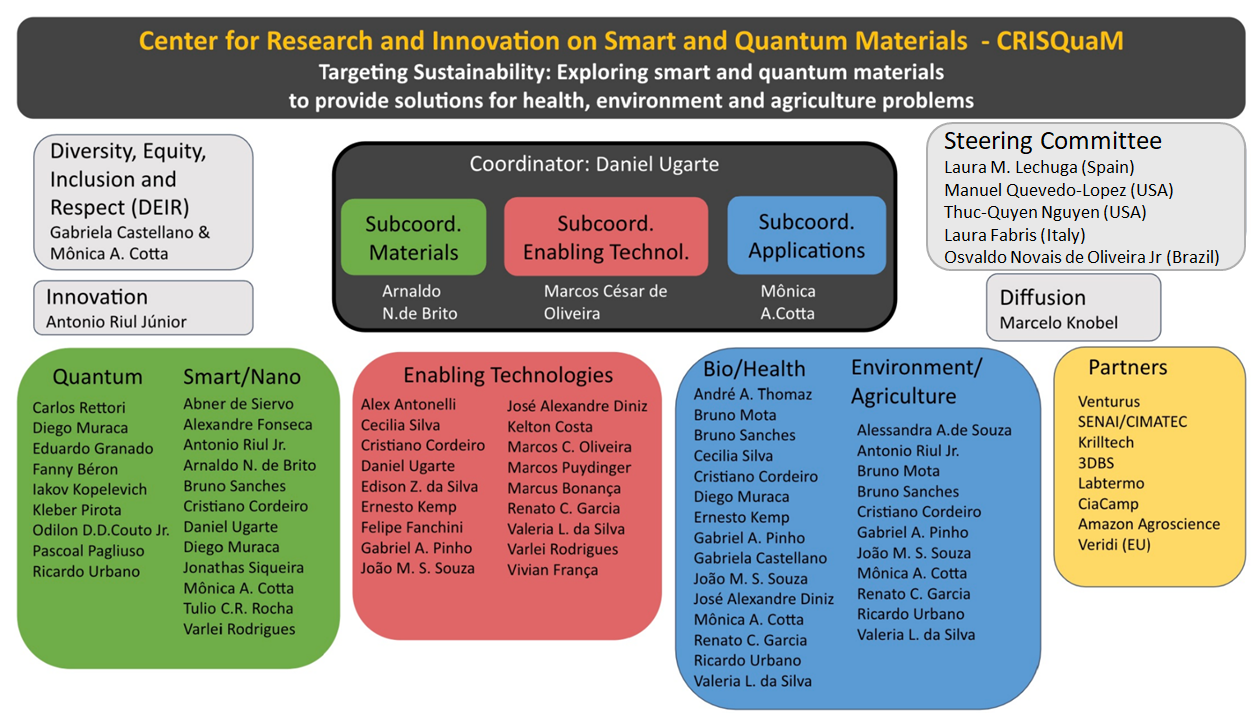BV-FAPESP: research projects supported in this Center
CRISQuaM in the Media: news about the center
CRISQuaM aims to explore the synergistic development of fundamental and applied science to create new materials with high potential for the construction of devices and sensors to address technological challenges related to sustainability, climate change, precision agriculture, ecology, and health. To achieve these goals, we have assembled an interdisciplinary and collaborative research team, integrating expertise across various scientific domains, researching novel materials with high innovation potential. By combining original synthesis methods, advanced characterization techniques, theoretical approaches, computational simulations, quantum technologies, and device construction designs, we aim to drive advances in smart and quantum materials, promoting scientific excellence and technological development. With this, we plan disruptive innovations in instrumentation—including hardware and AI-based tools—as well as in quantum technologies, biomedical devices, and signal processing, in addition to plant bionics, exploring plant-pathogen interactions. Besides research activities, we plan intensive actions in education, dissemination, and communication for the general public, as a modern society should be aware of the challenges humanity faces and how research and technology are essential for responsibly utilizing the planet's limited resources. CRISQuaM's Innovation activities are accelerated through partnerships with several companies in related technologies, many of them Brazilian. Finally, all activities of the Center are managed in accordance with diversity, equity, and inclusion goals and best practices.
The Center brings together scientists, engineers, and innovators in a collaborative effort to apply materials science and quantum technologies at the cutting edge, designing new materials and nano(bio)sensors for advanced diagnostics. The Center has a team capable of producing a wide range of (nano/micro) materials, along with precise chemical and physical characterizations using modern techniques (synchrotron, advanced microscopy, magnetotransport, magnetic resonance, optics, etc.). In addition, the team offers various options in enabling technologies, including miniaturization, processing, and additive manufacturing, as well as instrumentation, quantum sensing, and electronics development. Data analysis will employ updated approaches (numerical simulation, classical and quantum machine learning, and quantum optimization). Applications at the knowledge frontier will address urgent sustainability needs in environmental areas, precision agriculture, plant bionics, and biomedical interfaces, contributing to the development of local technologies in close partnership with the Brazilian industry.
The organization of the Center is based on three pillars — Materials, Enabling Technologies, and Applications — together with partner companies, as described in the figure below.

2024-02-01
Data from the Phase 3 clinical trial was published on February 1st in The New England Journal of Medicine. The vaccine is safe for both participants who have had dengue and those who have never been exposed to the virus before.
2024-01-31
This part of the seafloor in the South Atlantic is rich in cobalt, nickel and lithium, as well as tellurium and other rare earths critical to the energy transition. The scientists plan to continue research on its natural processes as a contribution to prospecting efforts.
2024-01-31
Developed by a team of Brazilian researchers, the device is made of plant-based material with little environmental impact, and detects pesticides in a few minutes, helping to certify food safety.
2024-01-31
André Morandini, Director of the University of São Paulo’s Center for Marine Biology, was on the team that has published a description of a rare medusa found at a depth of 812 meters. The animal has been sighted only twice in a deep-sea volcanic structure called Sumisu Caldera, in the Ogasawara Islands.
2024-01-31
In 18 cities of the Barretos region, where the proportion of Black people in the population is smaller, cancer kills more members of this ethnic group, whereas in the capital of the same state, it kills more White people, according to a study that compares cancer mortality rates and points to ways of reducing inequalities in diagnosis and treatment.
2024-01-24
In experiments with rats, researchers at São Paulo State University detected changes in the expression of more than 700 genes in offspring. One of these genes is known to be associated with prostate cancer.